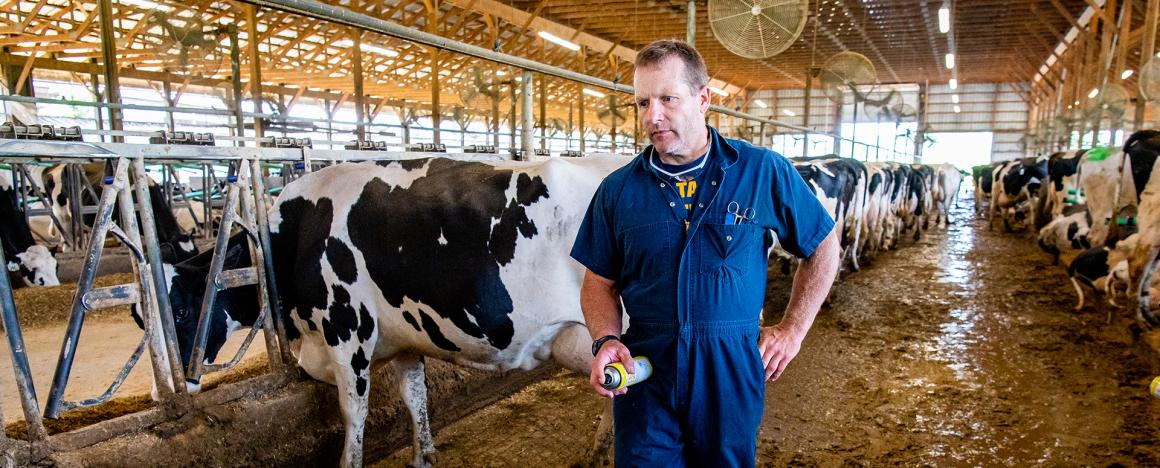Individual Animal Care for Cattle

-
Wellness care is an important part of our mission at Tufts Veterinary Field Service. Comprehensive physical examinations, routine vaccinations, illness diagnosis, parasite monitoring and developing deworming programs are all services offered to keep cows healthy and productive throughout their lives. Tufts Veterinary Field Service is also able to perform regular reproductive examinations including diagnosis of pregnancy with the use of a portable ultrasound machine.
Tufts Veterinary Field Service veterinarians are available for farm calls to examine cows that are off feed, failing to breed back, growing poorly, or showing other signs of illness. For clients, outside of our regular service area, haul-in appointments are also available at our clinic located in Woodstock, CT.
If your animal needs to be seen for any reason, the veterinarian will perform a complete physical examination to diagnose the animal’s problem. Following the examination, the veterinarian will recommend proper treatment protocols for your animal along with recommending means to prevent similar illnesses from affecting other animals in your herd. If the cause of your animal’s illness cannot be diagnosed by physical examination alone, additional diagnostics available include:
- Bloodwork (in-house or at outside laboratories)
- Fecal Analysis
- Portable Ultrasound (to aid in illness diagnosis, as well as pregnancy diagnosis)
- Portable Digital X-ray
- Feed Analysis
- Bacterial culturing
-
Tufts Veterinary Field Service can customize vaccination protocols for beef or dairy cattle to prevent common infectious diseases including Blackleg, Rabies and pneumonia.
Rabies is fatal virus that can infect the brain of any mammal, including cattle and humans. The virus is spread when a bite or scratches an uninfected animal. Rabies is endemic in New England, meaning it is regularly found in animals throughout the region. Protection is requiring an annual vaccine administered by a veterinarian. The vaccine can be given to cattle over 12 weeks of age. Rabies vaccination is required for cattle being exhibited at fairs or shows but is not required by state regulations in New England.
Blackleg is an acute, highly fatal disease of cattle and sheep caused by Clostridium bacteria. The first signs observed in a cow affected by Blackleg are typically lameness, loss-of-appetite, rapid breathing, depression, and a high fever. Characteristic swellings may develop in the hip, shoulder, chest, back or neck. The bacteria which cause Blackleg may be harbored in acidic soils like those found in New England and so cattle pastured in New England are frequently exposed to these bacteria.
Pneumonia is defined as inflammation of the lungs and is usually caused by viruses or bacteria. We routinely recommend that cattle be vaccinated against the common viral pneumonic pathogens including IBR, BVD, PI-3, and BRSV. Vaccines are also available against some of the common bacterial pneumonic pathogens such as Pasteurella and Mannheimia and use of these vaccines may be recommended in certain situations.
-
Internal and external parasites are common in cattle. Veterinarians at the Tufts Veterinary Field Service can help tailor a plan to help prevent parasitism in your cattle. If parasites are causing disease in your herd, our veterinarians can help diagnose their presence, aid in their removal and create a plan to prevent future infestations.
Common indicators of parasite infestations include:
- Diarrhea
- Swelling of the lower jaw (Bottle Jaw)
- Emaciation or poor growth
- Dull Hair Coats
- Lethargy
Tufts Veterinary Field Service offers in-house fecal analysis, which allows same day results. Fecal samples may be collected by the veterinarian that is examining your animal, may be dropped off at the clinic or may be mailed in via overnight service to arrive Monday-Friday at the clinic with an indication that the package should be opened immediately.
Tufts Veterinary Field Service’s fecal analysis is both qualitative and quantitative meaning the analysis will determine both which parasites are affecting your animals and whether the infection level is low, moderate, or high. Fecal results will be delivered to the owner by phone from a veterinarian or veterinary technician. Parasite control programs can be customized based on these results. Deworming programs vary greatly, depending on the individual animal’s history and level of infection. Ideally, it is recommending that fecals for cattle are performed twice a year, in the Spring and Fall.
-
Tufts Veterinary Field Service can perform surgical and non-surgical procedures at the clinic in Woodstock, CT as a haul-in service or at the animal’s home. Surgery in the haul-in facility at the clinic offers the advantage of allowing the veterinarians to use gas anesthesia which allows for longer procedures as well as more advanced monitoring options for the patient during the procedure.
The following surgical procedures are performed routinely by our veterinarians:
- Castration
- Cesarean Section
- Correction of displaced abomasums
- Cosmetic Dehorning
- Laceration Repair
- Laparoscopic Artificial Insemination